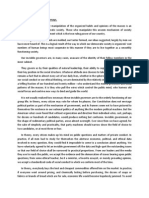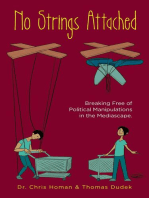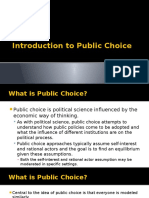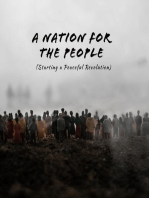Grade 11 IB - Human Rights Debate
Grade 11 IB - Human Rights Debate
Uploaded by
ChelseaCopyright:
Available Formats
Grade 11 IB - Human Rights Debate
Grade 11 IB - Human Rights Debate
Uploaded by
ChelseaOriginal Title
Copyright
Available Formats
Share this document
Did you find this document useful?
Is this content inappropriate?
Copyright:
Available Formats
Grade 11 IB - Human Rights Debate
Grade 11 IB - Human Rights Debate
Uploaded by
ChelseaCopyright:
Available Formats
Lies, fearmongering and fables: that’s our democracy
People power can challenge the status quo, but only if we understand our political
system has inherent flaws
George Monbiot
What if democracy doesn’t work? What if it never has and never will? What if government of
the people, by the people, for the people is a fairytale? What if it functions as a justifying myth
for liars and charlatans?
There are plenty of reasons to raise these questions. The lies, exaggerations and fearmongering
on both sides of the Brexit non-debate; the xenophobic fables that informed the Hungarian 5
referendum; Donald Trump’s ability to shake off almost any scandal and exposure; the election
of Rodrigo Duterte in the Philippines, who gleefully compares himself to Hitler: are these isolated
instances or do they reveal a systemic problem?
Democracy for Realists, published earlier this year by the social science professors Christopher
Achen and Larry Bartels, argues that the “folk theory of democracy” – the idea that citizens 10
make coherent and intelligible policy decisions, on which governments then act – bears no
relationship to how it really works. Or could ever work.
Voters, they contend, can’t possibly live up to these expectations. Most are too busy with jobs
and families and troubles of their own. When we do have time off, not many of us choose to
spend it sifting competing claims about the fiscal implications of quantitative easing. Even when 15
we do, we don’t behave as the theory suggests.
Our folk theory of democracy is grounded in an Enlightenment notion of rational choice. This
proposes that we make political decisions by seeking information, weighing the evidence and
using it to choose good policies, then attempting to elect a government that will champion those
policies. In doing so, we compete with other rational voters, and seek to reach the unpersuaded 20
through reasoned debate.
In reality, the research summarised by Achen and Bartels suggests, most people possess almost no
useful information about policies and their implications, have little desire to improve their state of
knowledge, and have a deep aversion to political disagreement. We base our political decisions on
who we are rather than what we think. In other words, we act politically – not as individual, 25
rational beings but as members of social groups, expressing a social identity. We seek out the
political parties that seem to correspond best to our culture, with little regard to whether their
policies support our interests. We remain loyal to political parties long after they have ceased
to serve us.
© David Ripley, Inthinking
http://www.thinkib.net/englishb
Of course, shifts do happen, sometimes as a result of extreme circumstances, sometimes 30
because another party positions itself as a better guardian of a particular cultural identity. But
they seldom involve a rational assessment of policy.
The idea that parties are guided by policy decisions made by voters also seems to be a myth; in
reality, the parties make the policies and we fall into line. To minimise cognitive dissonance –
the gulf between what we perceive and what we believe – we either adjust our views to those of 35
our favoured party or avoid discovering what the party really stands for. This is how people end
up voting against their interests. ....
You can read more of this article at ...
https://www.theguardian.com/commentisfree/2016/oct/04/democracy-people-power-governments-policy
Hyperlinks
In the original online version, the phrases in italics in the second paragraph were each linked to the following
sites. You can go to these sites to fill in the full background information
lies, exaggerations and fearmongering
https://www.theguardian.com/politics/2016/apr/03/claims-brexit-could-save-nhs-
dangerous-lie-ex-health-secretaries
xenophobic fables
https://www.theguardian.com/world/2016/oct/03/hungarian-jews-concerned-about-toxic-
referendum-discourse
Donald Trump
https://www.theguardian.com/us-news/series/lyin-trump-a-weekly-fact-check
Rodrigo Duterte
https://www.theguardian.com/world/2016/sep/30/rodrigo-duterte-vows-to-kill-3-million-
drug-addicts-and-likens-himself-to-hitler
© David Ripley, Inthinking
http://www.thinkib.net/englishb
Detailed understanding
Overall summary: To what extent does the extract express the author’s own personal point of view?
..................................................................................................................................
True/False and Justification – decide whether each of the following statements is true or false, and then
copy into the space provided a short quotation from the text which supports your judgement.
1. The ‘folk theory of democracy’ describes accurately how democracy works.
True? False?
Justification: ..................................................................................................................................
2. Few people ever think carefully about the arguments for particular policies.
True? False?
Justification: ..................................................................................................................................
3. In theory, democracy involves persuading people with good arguments
True? False?
Justification: ..................................................................................................................................
4. People like having political arguments.
True? False?
Justification: ..................................................................................................................................
5. Most people vote the same way as people who they think of as similar to them.
True? False?
Justification: ..................................................................................................................................
6. We may change our vote if a new party seems better able to protect who we think we are.
True? False?
Justification: ..................................................................................................................................
7. In modern democracies, it’s the voters who decide what the policies will be.
True? False?
Justification: ..................................................................................................................................
© David Ripley, Inthinking
http://www.thinkib.net/englishb
You might also like
- Know-It-All Society Truth and Arrogance in Political Culture by Michael P. LynchNo ratings yetKnow-It-All Society Truth and Arrogance in Political Culture by Michael P. Lynch171 pages
- UHU005 Report - Politics Without Principles PDFNo ratings yetUHU005 Report - Politics Without Principles PDF23 pages
- The Ass Is A Poor Receptacle For The Head: Why Democrats Suck At Communication, And How They Could ImproveFrom EverandThe Ass Is A Poor Receptacle For The Head: Why Democrats Suck At Communication, And How They Could Improve4/5 (5)
- Why I Will Not Vote in The Next ElectionNo ratings yetWhy I Will Not Vote in The Next Election3 pages
- Government Of the Politician By the Politician For the PoliticianFrom EverandGovernment Of the Politician By the Politician For the PoliticianNo ratings yet
- Achieving True Democracy: A New Breed of Party as Realistic Next StepFrom EverandAchieving True Democracy: A New Breed of Party as Realistic Next StepNo ratings yet
- No Strings Attached: How to Break Free of Political Manipulations in the MediascapeFrom EverandNo Strings Attached: How to Break Free of Political Manipulations in the MediascapeNo ratings yet
- Political Literacy and Civic ThoughtfulnessNo ratings yetPolitical Literacy and Civic Thoughtfulness47 pages
- My Name Is Patrick and I'm Politically Illiterate. You Are Too - The CorrespondentNo ratings yetMy Name Is Patrick and I'm Politically Illiterate. You Are Too - The Correspondent1 page
- The science of polarisation_ our model shows what happens when political opponents lose their personal connectionNo ratings yetThe science of polarisation_ our model shows what happens when political opponents lose their personal connection4 pages
- The People Have Spoken (and They Are Wrong): The Case Against DemocracyFrom EverandThe People Have Spoken (and They Are Wrong): The Case Against DemocracyNo ratings yet
- Why People Don't Think For Themselves -- How To Renew A Failing DemocracyFrom EverandWhy People Don't Think For Themselves -- How To Renew A Failing DemocracyNo ratings yet
- Down with Elections! a Plan for Democracy without ElectionsFrom EverandDown with Elections! a Plan for Democracy without ElectionsNo ratings yet
- The Big Bubble: How Technology Makes It Harder To Understand The WorldFrom EverandThe Big Bubble: How Technology Makes It Harder To Understand The WorldNo ratings yet
- Fools and Knaves: A Pragmatist’S View of the Economic Warfare Being Waged by the Republican Party Against the Great American Middle ClassFrom EverandFools and Knaves: A Pragmatist’S View of the Economic Warfare Being Waged by the Republican Party Against the Great American Middle ClassNo ratings yet
- Bernays - Propaganda (How The Media Molds Your Mind) (1928)No ratings yetBernays - Propaganda (How The Media Molds Your Mind) (1928)153 pages
- The Age of Post-Truth Politics - The New York TimesNo ratings yetThe Age of Post-Truth Politics - The New York Times5 pages
- Political Introverts: How Empathetic Voters Can Help Save American PoliticsFrom EverandPolitical Introverts: How Empathetic Voters Can Help Save American PoliticsNo ratings yet
- Confident Pluralism: Surviving and Thriving through Deep DifferenceFrom EverandConfident Pluralism: Surviving and Thriving through Deep Difference4.5/5 (2)
- Constructing - Us - Ideology, Coalition P - Bawn - KathleenNo ratings yetConstructing - Us - Ideology, Coalition P - Bawn - Kathleen33 pages
- Musings of A Moderate: Political Discourse in The Age of PolarizationFrom EverandMusings of A Moderate: Political Discourse in The Age of PolarizationNo ratings yet
- Only Possible Actor Is Gov, Then Functional Ought Argument (Macintyre)No ratings yetOnly Possible Actor Is Gov, Then Functional Ought Argument (Macintyre)5 pages
- Political Incompetence: What's Wrong With Our System and How To Fix ItFrom EverandPolitical Incompetence: What's Wrong With Our System and How To Fix ItNo ratings yet
- Sovereign Citizens - From Education To EncounterNo ratings yetSovereign Citizens - From Education To Encounter19 pages
- Outline for a New Human Rights InitiativeNo ratings yetOutline for a New Human Rights Initiative29 pages
- THE FOURTH WING OF AMERICAN GOVERNMENT: How Bureaucracy, Intelligence Agencies, LobbyistS, Corporations, and Medias Shape AmericanFrom EverandTHE FOURTH WING OF AMERICAN GOVERNMENT: How Bureaucracy, Intelligence Agencies, LobbyistS, Corporations, and Medias Shape AmericanNo ratings yet
- 5 Character Flaws That Are Destroying AmericaNo ratings yet5 Character Flaws That Are Destroying America3 pages
- 24-08-13 Chomsky: The U.S. Behaves Nothing Like A Democracy, But You'll Never Hear About It in Our 'Free Press'No ratings yet24-08-13 Chomsky: The U.S. Behaves Nothing Like A Democracy, But You'll Never Hear About It in Our 'Free Press'19 pages
- Voices of Reason: Calming the Conflicts in Political DiscussionsFrom EverandVoices of Reason: Calming the Conflicts in Political DiscussionsNo ratings yet
- Lawrence Erlbaum - Second Language Teacher Education International Perspectives 2005100% (7)Lawrence Erlbaum - Second Language Teacher Education International Perspectives 2005373 pages
- A Suggested Scaffold For Writing A Personal StatementNo ratings yetA Suggested Scaffold For Writing A Personal Statement2 pages
- A Review Paper On Extractive Techniques of Text SummarizationNo ratings yetA Review Paper On Extractive Techniques of Text Summarization4 pages
- Principles of Management Course Outline (Fall 2020) Instructor: Dr. Amna Niazi Course ObjectiveNo ratings yetPrinciples of Management Course Outline (Fall 2020) Instructor: Dr. Amna Niazi Course Objective2 pages

























































































